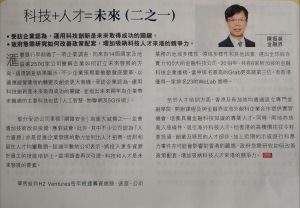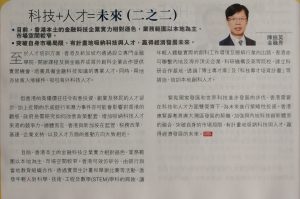

Translated version of Capital Weekly Legislative Councillor’s Column
Technology + Talent = Future
The Hongkong and Shanghai Banking Corporation Limited previously conducted a business survey of over 2,500 companies in 14 countries and territories for the purpose of understanding of how enterprises navigate directions for future development. The survey results indicated that many businesses are expected to promote radical changes so as to adapt to the changes in the business environment and create greater business opportunities. The respondents believe that the ability to leverage on innovative technology is critical to their future success. They also pointed out that “Artificial Intelligence, the Internet of Things and 5G technologies” are among the major technologies which could bring business opportunities in the next two years.
Some survey respondents see “cyber-security” as one of the major threats, and will increase investment in technology improvement to deal with the threat. In addition, many companies regard ‘human resources’ to be a growth driver for business development and cited talent recruitment, training and retention as difficult issues. More than half of the businesses expressed that they would devote more resources in enhancing the skills of their workforce. This survey once again testifies that technology and talent are the key success factors for future development.
KPMG and H2 Ventures select the top 100 Fintech companies around the globe annually, ranking them based on total capital raised, rate of fund raising, geographical diversity, sector diversity and other factors. In 2018, a total of 6 Singapore Fintech companies made the list, Grab took the highest rank amongst them, being the 3rd on the list. Hong Kong has only one entry, WeLab which ranked 23rd place.
In the area of talent training, Hong Kong and Singapore have been nurturing fintech professionals through the establishment of specialized academy of finance, courses and provision of internship opportunities by collaborating with the financial sector or overseas innovation and technology companies. At the same time, both places have relaxed immigration requirements to attract overseas technology talents. However, the high property prices in Hong Kong often discourage talents who are interested in investment, business startups and immigration. The recent demonstrations and violent incidents may also affect people’s perception of Hong Kong. The Government has a pressing need to study how to improve policy packages and enhance Hong Kong’s competitiveness in attracting technology talent.
In general, Hong Kong and Singapore are largely heading towards the same direction in terms of regulatory structure, tax reform, infrastructure, corporate support and talent development. At present, the corporate strengths of local Hong Kong fintech companies pale in comparison to Singapore, with business scope mainly local and market space being narrow. In fact, Hong Kong can follow the example of Silicon Valley to stimulate young people’s interest in science, technology, engineering and mathematics (STEM) disciplines through the collaboration of banks and local education organizations. By setting up internship programmes and organizing competitions, young people can gain practical experience in the working environments of innovation and technology and understand the career paths in the industry. Hong Kong can also liaise with top notch companies in the Mainland and overseas, scientific research institutions and universities to establish bases for research collaboration, and train local innovation and technology talents through measures such as the “Postdoctoral hub” and “Technology Talent Scheme”.
Keeping abreast of our country’s development and the worldwide progress of science and technology, Hong Kong needs to make strategic investment in the future by developing technology and talents simultaneously. Hong Kong should seize the opportunity of the development of the Guangdong-Hong Kong-Macao Greater Bay Area, to strengthen the integration with the Mainland’s technological innovation system, to breakthrough its own market constraints, and to introduce technology and attract talents systematically, thereby become a winner in future economic development.
